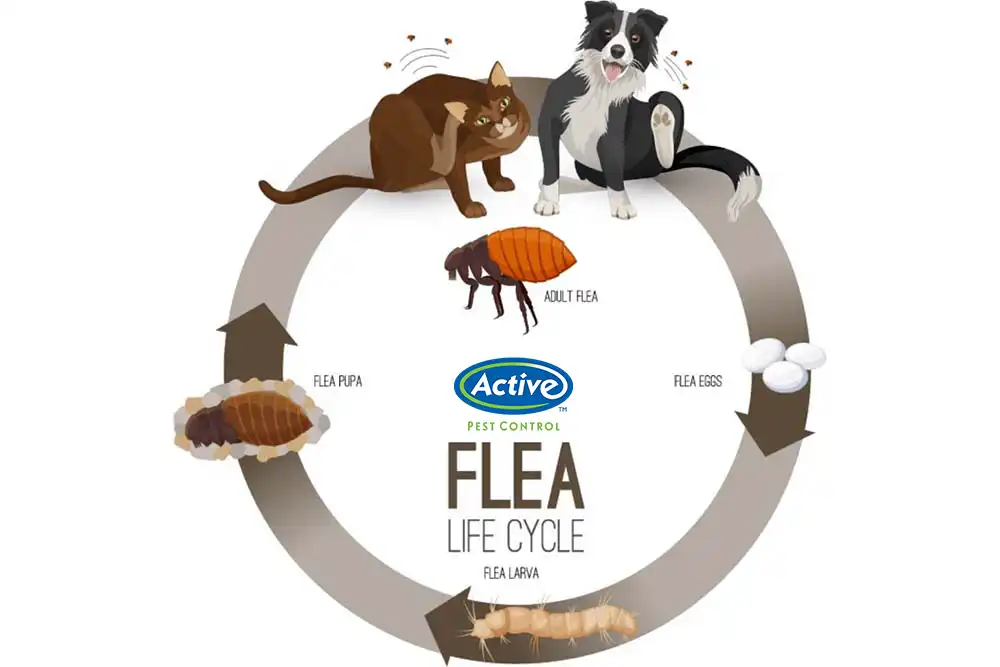 No one wants to deal with a mice infestation. Mice are a dreaded household pest because they spread disease and filth. Some of the signs you may have a mouse problem are droppings, foul odors, shredded insulation or cardboard, and—of course—spotting a mouse! Seeing even one may indicate that you have many more hidden, which is why it’s important to learn how to set a mousetrap.
No one wants to deal with a mice infestation. Mice are a dreaded household pest because they spread disease and filth. Some of the signs you may have a mouse problem are droppings, foul odors, shredded insulation or cardboard, and—of course—spotting a mouse! Seeing even one may indicate that you have many more hidden, which is why it’s important to learn how to set a mousetrap.
How Does a Mousetrap Work?
There are several types of mousetraps, including electronic, catch-and-release, and glue traps. All types have their pros and cons. Perhaps the most common and popular type of mousetrap is the spring-loaded mousetrap. This classic design has been used for decades to catch mice, and is easier to set up than you may think!
Spring-loaded mousetraps are placed in areas of suspected rodent activity with bait. When the spring mechanism is triggered, the metal bar will snap and effectively catch the mouse.
5 Best Mousetrap Tips
When learning how to set a mousetrap, there are some tips to keep in mind. By keeping the following mousetrap tips in mind, you can be successful in setting mousetraps:
- Use the best mousetrap bait
- Contrary to popular opinion, some mice like cheese, and some don’t.
- You only need to use a small amount of bait that cannot be reached unless mice step on the trap. If they can swipe it without standing on the trap, they will!
- Start with unloaded mousetraps
- It may seem counter-intuitive, but start with unloaded traps (baited but not activated)!
- Mice are extremely skeptical of new things–especially human things.
- Set traps out with bait (without loading them) for a couple of nights. It lulls mice into a false sense of security.
- Use multiple traps at once
- By setting multiple traps two to three feet apart each, you have a better chance at catching as many mice as possible at once.
- Set mousetraps in the right places
- Mice travel along walls, under furniture, and generally any place that offers cover.
- Place mousetraps along walls and behind furniture, with the bait placed nearest to the wall.
- Check your mousetraps regularly
- Your mouse problem is not going to be gone overnight. It takes diligence to make sure traps are working, set, and not going to waste!
- Mice can, in some instances, grab bait without setting off the trap. They can also set the trap off without getting caught!
House Mouse Exterminators
If you’re still dealing with mice even after setting a few traps, it may be time to enlist the help of a professional pest control company. At Active Pest Control, our mice exterminators have years of experience properly getting rid of rodents in homes and businesses throughout Georgia. We will thoroughly inspect your property for sources of the infestation and customize a rodent control plan suited to your needs. To learn more about how to set a mousetrap or other mice extermination methods, give our team a call today!


 Many people think pest problems only occur in the summer, but rodent infestations are very common in the winter! According to The National Pest Management Association (NPMA), 21 million homes in the U.S. are invaded by rodents each winter. As temperatures drop, rats and mice will look to make their way indoors for warmth and shelter. To avoid the diseases and destruction brought from rodent infestations, it’s important to implement rodent control into your home each year. Keep reading for Active Pest Control’s top tips for rats and mice prevention in the winter.
Many people think pest problems only occur in the summer, but rodent infestations are very common in the winter! According to The National Pest Management Association (NPMA), 21 million homes in the U.S. are invaded by rodents each winter. As temperatures drop, rats and mice will look to make their way indoors for warmth and shelter. To avoid the diseases and destruction brought from rodent infestations, it’s important to implement rodent control into your home each year. Keep reading for Active Pest Control’s top tips for rats and mice prevention in the winter.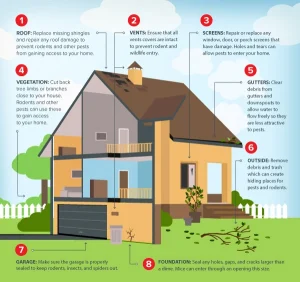 There are eight spots in particular around your property that are vulnerable to rodent intrusions. By routinely checking the following areas, you can locate where rats and mice may attempt to make their way indoors. It’s important to make any repairs promptly and, in general, keep a tidy home and yard to prevent rodents. The eight main locations to check and make repairs include:
There are eight spots in particular around your property that are vulnerable to rodent intrusions. By routinely checking the following areas, you can locate where rats and mice may attempt to make their way indoors. It’s important to make any repairs promptly and, in general, keep a tidy home and yard to prevent rodents. The eight main locations to check and make repairs include: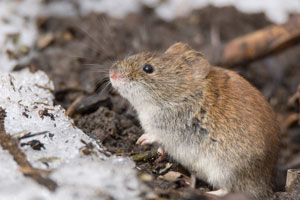 Everyone knows pests are a problem in the spring and summer months, but what about in the winter? Unfortunately, pests don’t disappear with the colder weather. In fact, many pests will look for ways to enter homes to escape the dropping temperatures, which is why infestations are common in Georgia winters. To protect your property from pest problems in the winter, it’s important to implement pest control and prevention.
Everyone knows pests are a problem in the spring and summer months, but what about in the winter? Unfortunately, pests don’t disappear with the colder weather. In fact, many pests will look for ways to enter homes to escape the dropping temperatures, which is why infestations are common in Georgia winters. To protect your property from pest problems in the winter, it’s important to implement pest control and prevention.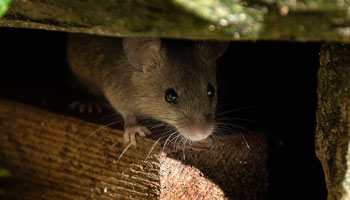 Fall is considered by most people to be one of the nicest times of the year. Cooler temperatures not only signal the start of the holiday season but also the beginning of rodent season. Every October,
Fall is considered by most people to be one of the nicest times of the year. Cooler temperatures not only signal the start of the holiday season but also the beginning of rodent season. Every October, 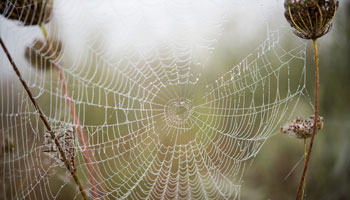 In addition to the many Halloween spider decorations you may be seeing in your neighbor’s yards, have you been noticing more spiders inside your home? Like many other types of pests, spiders start to make their way indoors when fall rolls around. Many are searching for a mate, and others are looking to escape the cooling temperatures outdoors in the Atlanta area. No one wants to deal with spiders in their home, which is why it’s important to know how to spider-proof your home. Read on for Active Pest Control’s top tips for keeping spiders outside this fall.
In addition to the many Halloween spider decorations you may be seeing in your neighbor’s yards, have you been noticing more spiders inside your home? Like many other types of pests, spiders start to make their way indoors when fall rolls around. Many are searching for a mate, and others are looking to escape the cooling temperatures outdoors in the Atlanta area. No one wants to deal with spiders in their home, which is why it’s important to know how to spider-proof your home. Read on for Active Pest Control’s top tips for keeping spiders outside this fall.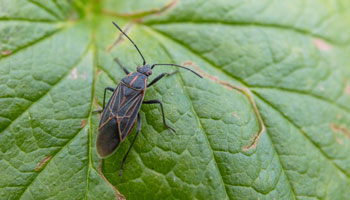 As summer weather begins to shift and the cooler days of fall approach, many pest populations will die out. However, there are a couple of types of insects common in Georgia that will multiply drastically and invade homes to overwinter: boxelder bugs and stink bugs! During the spring and summer, these odorous insects spend their time outdoors, likely in trees and thus away from human activity. However, they infamously look for structures to invade in the fall, which is why it’s important to know how to protect your home from these autumn invaders!
As summer weather begins to shift and the cooler days of fall approach, many pest populations will die out. However, there are a couple of types of insects common in Georgia that will multiply drastically and invade homes to overwinter: boxelder bugs and stink bugs! During the spring and summer, these odorous insects spend their time outdoors, likely in trees and thus away from human activity. However, they infamously look for structures to invade in the fall, which is why it’s important to know how to protect your home from these autumn invaders!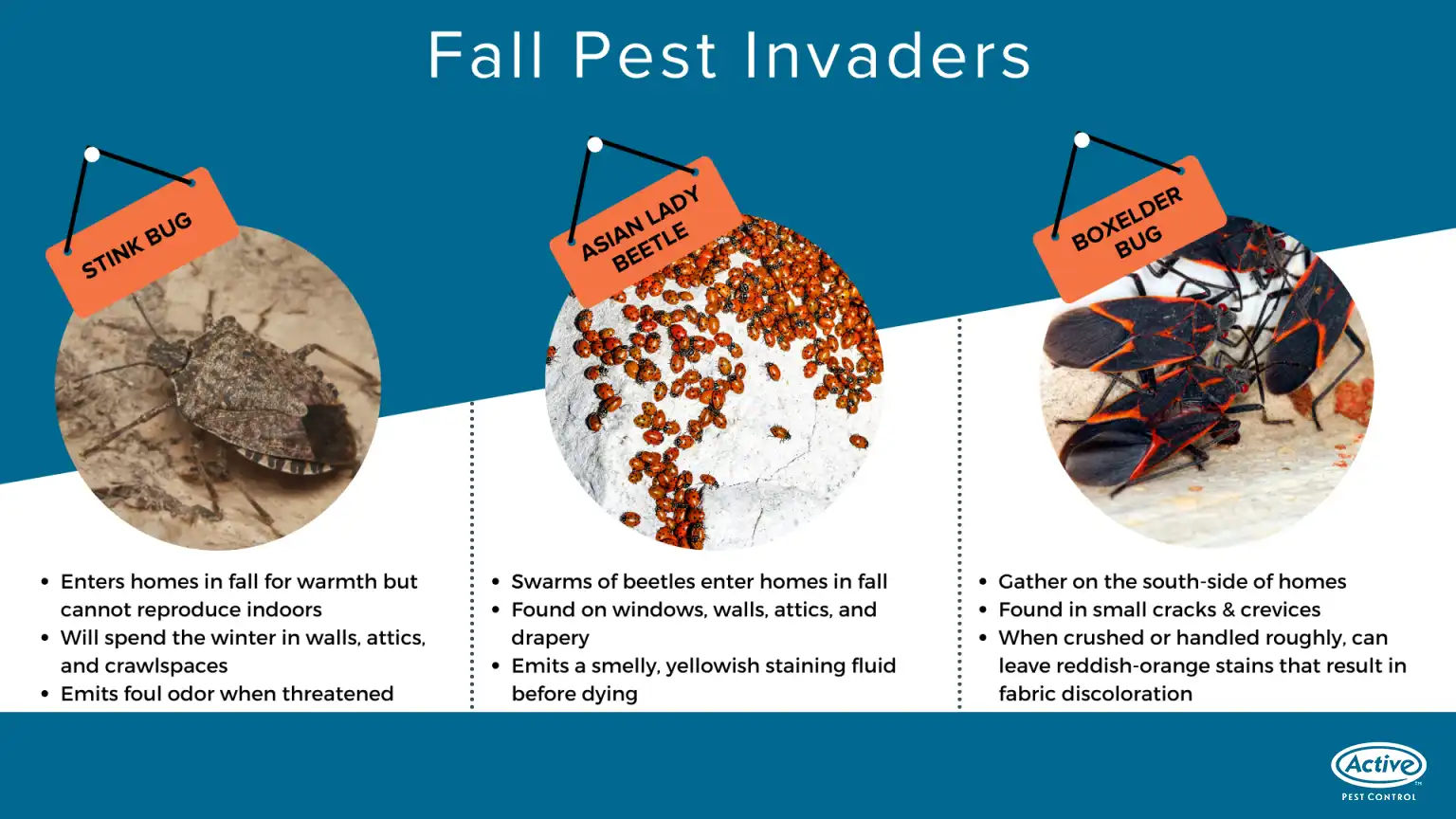
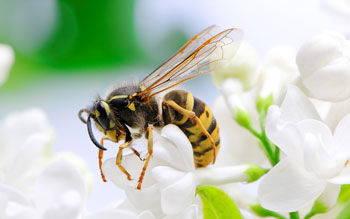 If you’ve attended an outdoor barbecue picnic during the late summer in Georgia, you probably have dealt with yellow jackets trying to crash your party. Yellow jackets and wasps hatch in the spring and their populations grow throughout the summer. By the time fall rolls around, these stinging insects become more aggressive as they look for extra resources to support themselves. Understanding their behavior during this time of year is the key to preventing them from invading your outdoor activities!
If you’ve attended an outdoor barbecue picnic during the late summer in Georgia, you probably have dealt with yellow jackets trying to crash your party. Yellow jackets and wasps hatch in the spring and their populations grow throughout the summer. By the time fall rolls around, these stinging insects become more aggressive as they look for extra resources to support themselves. Understanding their behavior during this time of year is the key to preventing them from invading your outdoor activities!